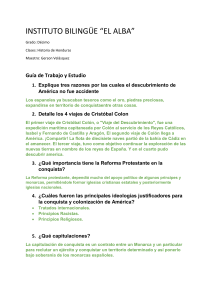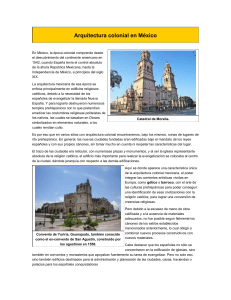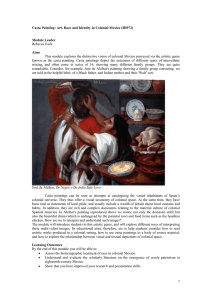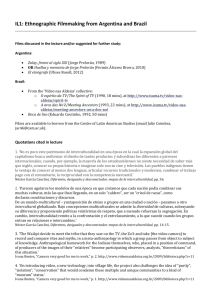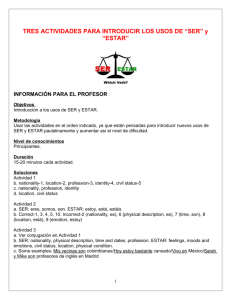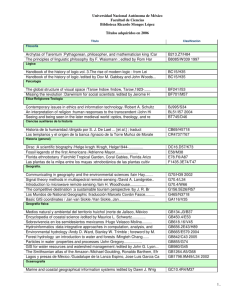SPA 650 Studies in Colonial Latin American Literature Race and
advertisement
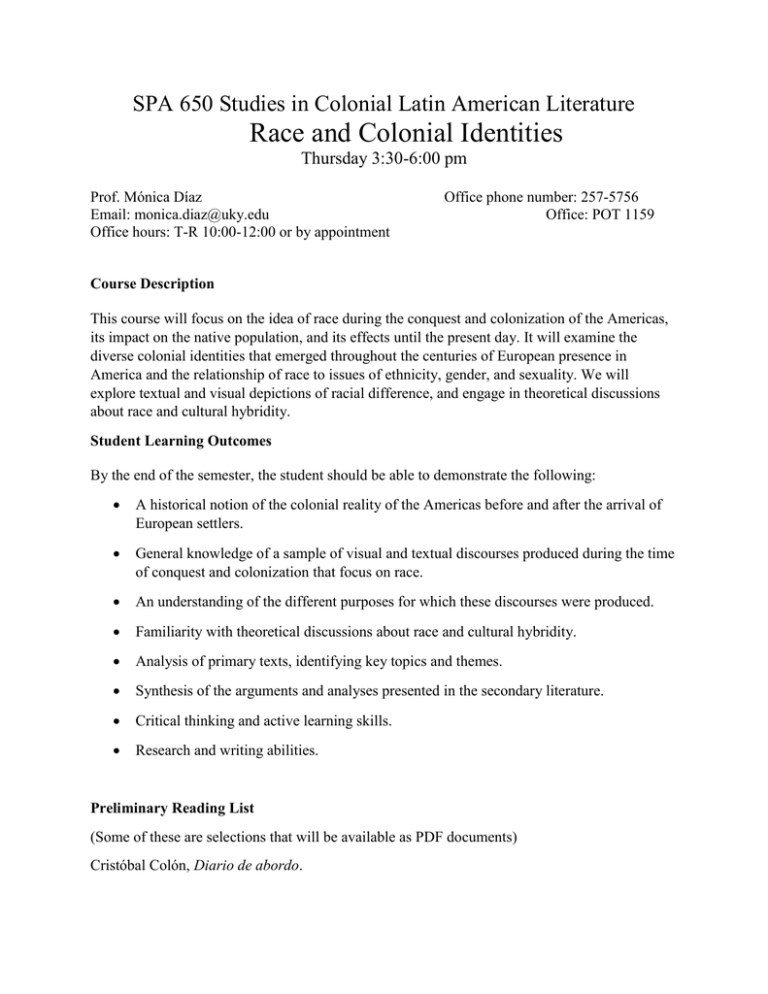
SPA 650 Studies in Colonial Latin American Literature Race and Colonial Identities Thursday 3:30-6:00 pm Prof. Mónica Díaz Email: monica.diaz@uky.edu Office hours: T-R 10:00-12:00 or by appointment Office phone number: 257-5756 Office: POT 1159 Course Description This course will focus on the idea of race during the conquest and colonization of the Americas, its impact on the native population, and its effects until the present day. It will examine the diverse colonial identities that emerged throughout the centuries of European presence in America and the relationship of race to issues of ethnicity, gender, and sexuality. We will explore textual and visual depictions of racial difference, and engage in theoretical discussions about race and cultural hybridity. Student Learning Outcomes By the end of the semester, the student should be able to demonstrate the following: A historical notion of the colonial reality of the Americas before and after the arrival of European settlers. General knowledge of a sample of visual and textual discourses produced during the time of conquest and colonization that focus on race. An understanding of the different purposes for which these discourses were produced. Familiarity with theoretical discussions about race and cultural hybridity. Analysis of primary texts, identifying key topics and themes. Synthesis of the arguments and analyses presented in the secondary literature. Critical thinking and active learning skills. Research and writing abilities. Preliminary Reading List (Some of these are selections that will be available as PDF documents) Cristóbal Colón, Diario de abordo. Felipe Guaman Poma de Ayala, El primer nueva corónica y buen gobierno. http://www.kb.dk/permalink/2006/poma/info/en/frontpage.htm Fernando de Alva Ixtlilxochitl, Historia de la nación Chichimeca. Francisco Javier Clavijero, Historia antigua de México. Fray Ramón Pané, Relación acerca de las antigüedades de los indios. James Lockhart, ed. We People Here: Nahuatl Accounts of the Conquest of Mexico.(Códice Florentino, Libro 12) Jerónimo de Mendieta, Historia eclesiástica indiana. José de Acosta, Historia natural y moral de las Indias. Lienzo de Tlaxcala. Nican Mopohua: Apariciones de Guadalupe. Secondary sources: Adorno, Rolena. 1991. “Images of Indios Ladinos in Early Colonial Peru.” In Transatlantic Encounters: Europeans and Andeans in the Sixteenth Century, edited by Kenneth J. Adrien and Rolena Adorno, 232-270. Berkeley: University of California Press. Bhaba, Homi. 1994. The Location of Culture. London: Routledge. Brubaker, Rogers, and Frederick Cooper. 2000. “Beyond ‘Identity.’” Theory and Society. 29:147. Burns, Kathryn. 2007. “Unfixing Race.” In Rereading the Black Legend, edited by Margaret Greer, Walter Mignolo and Maureen Quilligan, 188-202. Chicago: University of Chicago Press. de la Cadena, Marisol. 2005. “Are ‘Mestizos’ Hybrids? The Conceptual Politics of Andean Identities.” Journal of Latin American Studies. 37.2:259-284. Dean, Carolyn and Dana Leibsohn. 2003. “Hybridity and Its Discontents: Considering Visual Culture in Colonial Spanish America.” Colonial Latin American Review 12.1: 5-35. Elliot, John H. 1987. “Introduction: Colonial Identity in the Atlantic World.” In Colonial Identity in the Atlantic World, 1500-1800, edited by Nicholas Canny and Anthony Pagden, 3-13. Princeton, Princeton University Press. Hall, Stuart. 1996. “Introduction: Who Needs ‘Identity’?” In Questions of Cultural Identity, edited by Stuart Hall and Paul Du Gay, 1-17. London: Sage Publications. Pagden, Anthony. 1982. The Fall of Natural Man: The American Indian and the Origins of Comparative Ethnology. Cambridge: Cambridge University Press. Young, Robert. 1995. Colonial Desire: Hybridity in Theory, Culture and Race. London: Routledge.
